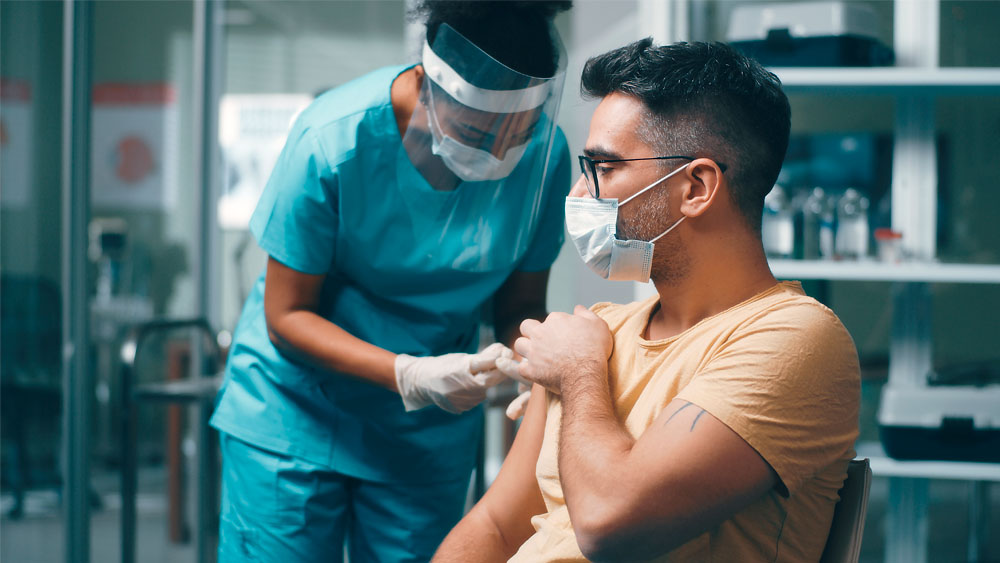
The FDA has authorized the use of mix-and-match booster doses for currently available COVID-19 vaccines based on the results of a NIAID-supported study.

The FDA has authorized the use of mix-and-match booster doses for currently available COVID-19 vaccines based on the results of a NIAID-supported study.
What you need to know
The immune response to COVID-19 vaccines may wane over time. Booster shots are a safe and effective way to extend protection against variants of concern. Mixing vaccines may enhance the immune response, and it increases flexibility for when people need a booster dose but doses of the vaccine they first received are not available.
The National Institute of Allergy and Infectious Diseases (NIAID) is leading and funding a study in which adults who have been fully vaccinated against COVID-19 receive booster doses of different COVID-19 vaccines. The goal of this study is to determine whether receiving a booster dose of a different COVID-19 vaccine is safe and how the immune system responds to that dose.
Based on initial data from this study, the U.S. Food and Drug Administration (FDA) has authorized the use of mix-and-match booster doses for currently available COVID-19 vaccines.
What are the researchers doing?
The researchers are part of NIAID’s Infectious Diseases Clinical Research Consortium. They have enrolled approximately 450 individuals in the first nine study groups who had already received one of the three COVID-19 vaccine regimens currently available in the United States:
-
The Pfizer-BioNTech vaccine (BNT162b2), which is approved for people age 16 and older and is authorized under emergency use for children and teens 5 to 15 years old
-
The Moderna vaccine (mRNA-1273), which is authorized under emergency use for people age 18 and older
-
The Johnson & Johnson/Janssen vaccine (Ad26.COV2-S), which is authorized under emergency use for people age 18 and older
Participants received a single booster dose of either the same vaccine as they had in the first place or a different vaccine.
Participants are providing blood samples periodically so the researchers can observe their immune response. If participants develop COVID-19, investigators will perform genetic sequence analyses on the participant samples to see whether the infection was caused by a variant strain of the virus that causes COVID-19. Additional arms of the trial may test other COVID-19 vaccines.
What did the researchers find?
People produced antibody responses from all three booster vaccines, no matter which vaccine they had originally received. A booster of a different vaccine caused similar or higher antibody responses than a booster of the same vaccine.
Antibody production is not the only way the immune system responds to vaccines. Researchers also measured the levels of CD4 and CD8 T cells, two types of immune cells that could help fight COVID-19. The levels of both cells increased after the booster in every group except the one that received the Johnson & Johnson vaccine for the original shot and the booster. However, at the beginning of the study, people who had received the Johnson & Johnson vaccine already had higher levels of CD8 T-cells than those who received the other vaccines.
The participants kept diaries of any side effects. The researchers found no sign of safety problems with any of the booster doses.
Why is this research important?
The research helps clinicians and decision makers decide who should get a booster dose of COVID-19 vaccine and which vaccine they should receive. This will ultimately help protect people from infection and serious disease.
Where can I go to learn more?
Mix-and-match trial finds additional dose of COVID-19 vaccine safe, immunogenic
-
An NIH-supported study assessed booster doses in adults who were fully vaccinated with any authorized or approved COVID-19 vaccine.
-
NIAID conducts and supports clinical research to prevent, treat, and better understand COVID-19.
FDA Takes Additional Actions on the Use of a Booster Dose for COVID-19 Vaccines
-
On October 20, 2021, the FDA announced expanded authorizations for COVID-19 vaccine booster doses, including the authorization of mix-and-match booster dosing.
NIH Clinical Trial Evaluating Mixed COVID-19 Vaccine Schedules Begins
-
In June of 2021, NIH announced the beginning of the trial to understand the safety and effectiveness of mixed boosted vaccine regimens.
Sources
Atmar, R.L., Lyke, K. E., Deming, M. E., Jackson, L. A., Branche, A. R., El Sahly, H. M., Rostad, C. A., Martin, J. M., Johnston, C., Rupp, R. E., Mulligan, M. J., Brady, R. C., Frenck Jr., R. W., Bäcker, M., Kottkamp, A. C., Babu, T. M., Rajakumar, K., Edupuganti, S., Dobrzynski, D., … Beigel, J. H. for the DMID 21-0012 Study Group (2022). Homologous and Heterologous Covid-19 Booster Vaccinations. New England Journal of Medicine. https://doi.org/10.1056/NEJMoa2116414
Lyke, K. E. (2021, October 14-15). DMID 21-0012 — Heterologous Platform Boost Study. Presentation to the Vaccines and Related Biological Products Advisory Committee. Retrieved November 19, 2021, from https://www.fda.gov/media/153128/download.

News and Stories
Read stories about the efforts underway to prevent, detect, and treat COVID-19 and its effects on our health.
 An official website of the United States government
An official website of the United States government

